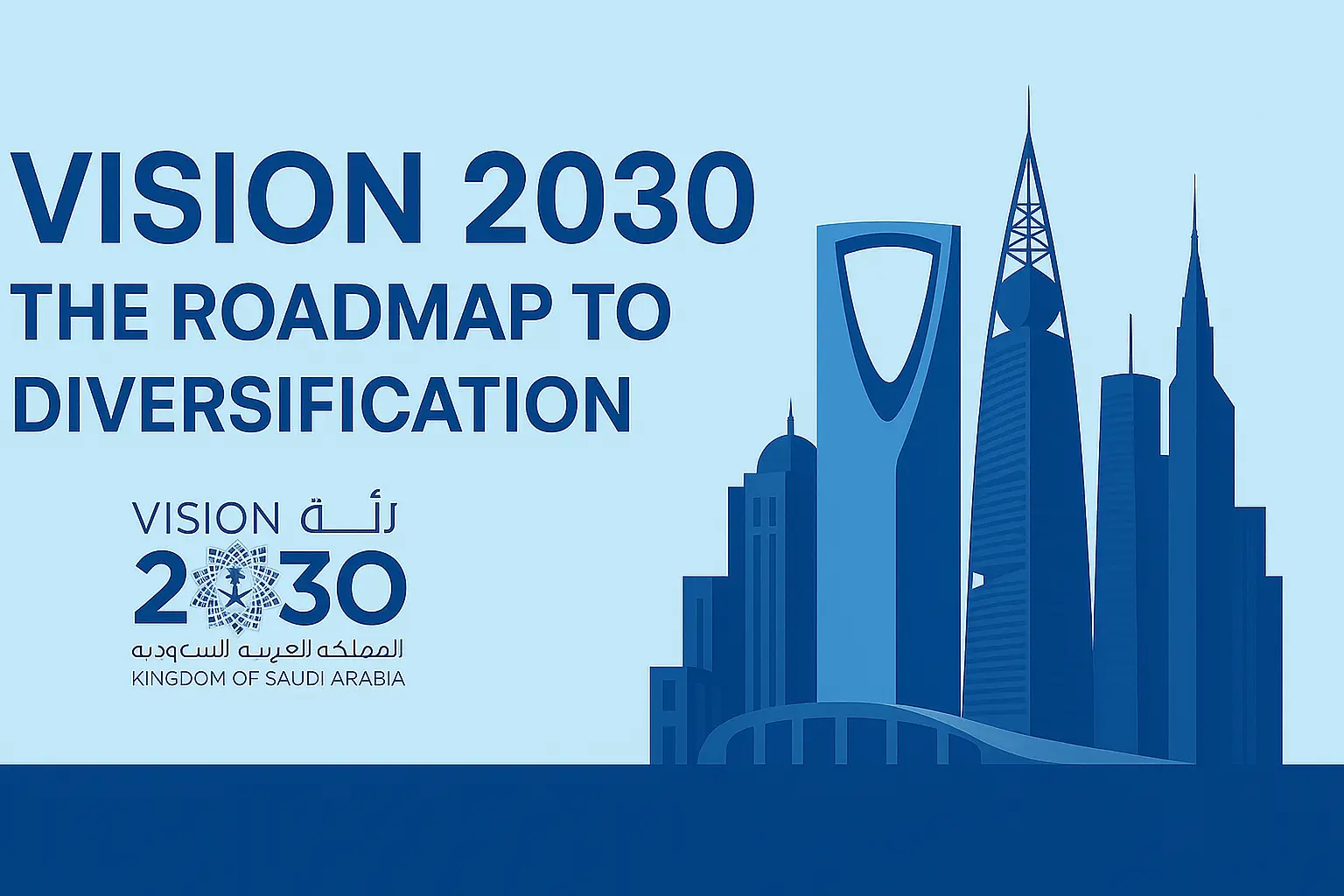How Artificial Intelligence is Driving Economic Diversification in Saudi Arabia
Introduction
The Kingdom of Saudi Arabia (KSA) is undergoing one of the most ambitious socio-economic transformations in the world today. Under the strategic blueprint of Vision 2030, the country is shifting its economic dependence from oil to knowledge-based, innovation-driven sectors. At the heart of this transformation lies Artificial Intelligence (AI), a technology not only reshaping industries but redefining the role of Saudi Arabia in the global digital economy.
AI is more than a tool; it’s a catalyst for economic diversification, job creation, improved public services, and technological leadership. With a combination of strategic investments, infrastructure development, global partnerships, and youth upskilling, Saudi Arabia is actively positioning itself as the AI hub of the Middle East and increasingly, the world.
Semantic Brains: A Key Enabler of Saudi Arabia’s Digital Future
Semantic Brains is actively contributing to Saudi Arabia’s digital transformation under Vision 2030 by providing AI-powered solutions across various sectors. The company specializes in areas such as business intelligence, machine learning, and smart infrastructure, aligning with the Kingdom’s objectives to diversify its economy and foster innovation. Semantic Brains’ initiatives support the development of a data-driven digital economy, enhancing efficiency and productivity in healthcare, retail, and government services. Their efforts exemplify the practical application of AI technologies to achieve the strategic goals outlined in Vision 2030.
1. Vision 2030: The Roadmap to Diversification

Vision 2030, launched in 2016 by Crown Prince Mohammed bin Salman, outlined a bold goal: reduce the Kingdom’s over-reliance on oil, and diversify into tourism, health, education, digital infrastructure, logistics, and renewable energy. As part of this transformation, AI is foundational by enabling faster, smarter decision-making, automating services, and enhancing productivity across sectors.
To support this vision, the National Strategy for Data and AI (NSDAI) was introduced. The strategy aims to position Saudi Arabia among the top 15 nations in AI by 2030. It focuses on AI regulation, research, capability building, and economic development.
2. Strategic Investments and National Initiatives in AI
The Saudi government has committed billions of dollars toward AI infrastructure. The Public Investment Fund (PIF) launched a new AI company called “Alat” and invested in Humain, an initiative that develops AI-driven data centers, large language models, and sovereign AI capabilities.
Key efforts include:
- $40 billion investment in AI companies through a planned partnership with US VC firms.
- Establishment of the Saudi Data and Artificial Intelligence Authority (SDAIA) to oversee the national AI strategy.
- Hosting the Global AI Summit, attracting international AI leaders to Riyadh.
- Building 18,000+ GPU-equipped data centers in collaboration with NVIDIA and other global tech firms.
These investments are not just creating infrastructure—they are anchoring Saudi Arabia’s role in the global AI supply chain.
3. AI in Healthcare: Revolutionizing National Health Services
The healthcare sector is a major focus of digital transformation. AI is being used to predict disease outbreaks, optimize hospital resource allocation, and enhance diagnostics through radiology, pathology, and personalized medicine.
One notable example is MedScanAI, which uses machine learning to support early diagnosis and automate radiology workflows in public hospitals. This increases efficiency, reduces misdiagnoses, and allows hospitals to handle growing patient volumes.
AI chatbots, diagnostic tools, and patient data management systems are also contributing to cost reduction and improved patient outcomes, key pillars of a diversified and sustainable healthcare economy.
4. AI in Education: Building the Workforce of the Future
Saudi Arabia’s youth represent over 60% of the population—a critical advantage in building an AI-first economy. Through public-private partnerships, AI is being integrated into education to personalize learning, identify student weaknesses, and deliver real-time feedback.
Key initiatives:
- National AI education modules have been introduced in secondary schools and universities.
- Collaborations with Coursera, Udacity, and Google Cloud for AI certifications.
- King Abdullah University of Science and Technology (KAUST) and King Saud University are investing in AI research labs and centers of excellence.
By embedding AI in the curriculum and supporting R&D, the Kingdom is developing a homegrown generation of AI talent — one of the most crucial enablers of diversification.
5. AI in Finance: Accelerating Fintech and Risk Management
The financial sector is rapidly adopting AI for fraud detection, customer personalization, credit scoring, and real-time trading algorithms. This is helping shift Saudi Arabia from a legacy banking system to a thriving fintech ecosystem.
Startups and banks are using AI to:
- Automate KYC (Know Your Customer) processes.
- Detect suspicious transactions using pattern recognition.
- Launch AI-powered robo-advisors for wealth management.
This has made financial services more accessible, efficient, and secure, opening doors for entrepreneurs, SMEs, and foreign investors—key actors in economic diversification.
6. AI in Logistics and Smart Infrastructure
Saudi Arabia’s geographic location makes it ideal for becoming a global logistics hub. AI is now central to optimizing supply chains, managing ports, and enabling smart city development.
Projects like NEOM, the $500B futuristic city, rely heavily on AI:
- Self-healing infrastructure and AI-powered urban planning.
- Autonomous transport systems and robotic deliveries.
- Environmental monitoring using AI-based sensors and drones.
AI also powers smart traffic management in Riyadh and Jeddah, reducing congestion and pollution—critical improvements for sustainable urban development.
7. AI in Energy and Sustainability
Even as Saudi Arabia diversifies away from oil, it is modernizing its energy sector with AI:
- Predictive maintenance in oil refineries and petrochemical plants.
- AI-based energy grid management to reduce waste and outages.
- Accelerated investment in renewables, especially solar farms, using AI for energy forecasting and load balancing.
The Kingdom is also investing in carbon capture and environmental AI solutions as part of its Green Initiative, aiming to reach net-zero by 2060.
8. AI and the Rise of Local Innovation Ecosystems
Economic diversification is not just about foreign investment. Saudi Arabia is nurturing a local startup ecosystem, where AI is the common thread.
Notable AI startups and incubators include:
- SURE, a logistics startup using AI for route optimization.
- Mozn specializes in financial AI compliance tools.
- Takamol, integrating AI in HR tech and government services.
Accelerators like Misk Foundation, Badir Program, and SDAIA AI Incubator are providing funding, mentorship, and training to Saudi entrepreneurs, helping them scale into regional players.
9. Empowering Women and Youth through AI
A diversified economy is an inclusive economy. Saudi Arabia is using AI to close gaps, not widen them.
- Remote work enabled by AI platforms has increased job access for women.
- Training programs specifically target women in data science and AI, with rising participation in STEM fields.
- Youth-led AI hackathons and innovation challenges are drawing record participation across the Kingdom.
These efforts ensure that everyone has a role in building the new economy, not just engineers or investors, but educators, creators, and citizens.
10. Global Positioning and AI Diplomacy
Saudi Arabia is not just transforming internally—it’s becoming an AI power on the global stage.
- Hosting international summits and inviting tech leaders (e.g., Groq, a16z) to co-develop infrastructure.
- Proposing regulatory frameworks for ethical AI in alignment with global standards.
- Entering partnerships with China, the U.S., and European AI labs to exchange knowledge and build joint ventures.
This positions KSA not only as a regional leader but as a strategic AI partner in shaping the global digital economy.
Conclusion:
The Long-Term PayoffAI is not a short-term play for Saudi Arabia. It is a foundational pillar in a long-term economic transformation, from oil dependency to digital sovereignty.
With investments in infrastructure, education, innovation, and regulation, AI is creating new sectors, new jobs, and new capabilities. The Kingdom’s bold vision is not just to adopt AI, but to lead it—ethically, inclusively, and sustainably.
And if current momentum continues, Saudi Arabia may well emerge as the AI capital of the Global South, proving that with the right vision, even the most traditional economies can rewire themselves for a smarter, more diverse future.


